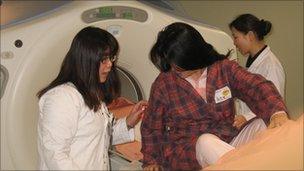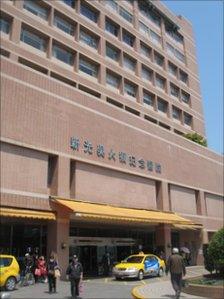Taiwan taps China for lucrative medical tourism market
- Published

Taiwan is hoping to become the go-to destination for Chinese medical tourists
Sunlight floods in through the large windows of Shin Kong Memorial Hospital's lobby.
Just past the front doors, several ladies at the information desk are ready to answer visitors' questions.
Many chairs are available for patients waiting for their prescriptions to be filled.
This is the kind of hospital Taiwan has.
It is a stark contrast to those in mainland China, which are plagued with old facilities, crowded conditions and generally poor service.
Patients there wait all day for rushed consultations with doctors.
Taiwan's government hopes its medical services will impress the growing number of Chinese tourists visiting the island.
Its goal: to grab a share of the multi-billion dollar global medical tourism market - especially through China.
Regional competition
The high-tech manufacturing island entered this field in 2007, much later than Asian competitors.
Last year it saw about 85,000 medical tourists, far fewer than Thailand and Singapore, which attracted more than 1m and 665,000 medical tourists, respectively.
The Taiwanese industry's $73m (£45m) in annual revenue is also much lower than that of its competitors.
But as relations with its former rival China improves, Taiwan's government is confident the island can seize a big share of what it believes will be a huge market of Chinese tourists seeking quality medical care overseas.
Since the end of a civil war in 1949, Taiwan has been ruled separately, but China still sees it as a province to be reunified.
Chinese tourists were not allowed to visit the island until relations improved in 2008.
Since then, the number of Chinese visitors has skyrocketed to more than 1.5 million last year.
Industry officials estimate as many as 5% of the visitors will want to receive medical treatment here.
This is because many Chinese can now afford quality medical care overseas.
"Their income has risen," says Babs Chang, a project manager at the government agency in charge of developing the industry.
"Other than pursuing a better standard of living, their biggest concern is health."
Most of the Chinese medical tourists coming here are in the middle or upper income classes, with many rich housewives or business people.
Taiwan is the ideal place for them, given its advanced health care system, proximity to China, as well as similarities in language and culture, according to Wu Ming-yen, chief executive of the Taiwan Task Force for Medical Travel.
Josef Woodman, author of Patients Beyond Borders, the leading consumer guide to international medical travel, agrees that Taiwan is well positioned to tap the China medical tourism market.

Taiwan's cultural similarities and proximity to China give it an advantage over regional competitors
The middle class in China is growing far more rapidly than the Chinese healthcare system can keep up with, he says.
"Until that gap abates, you'll see a growing trend of wealthy mainland Chinese heading cross-border for higher quality care - to the US, Taiwan and Singapore," Mr Woodman says.
Taiwan's cheaper costs, compared to other developed countries, could help it attract not only Chinese medical tourists, but Chinese-speaking patients from other countries, Woodman said.
Opportunity to grow
To seize the opportunities, Taiwan's government has identified medical tourism as one of six new industries to focus on.
The government and hospitals have poured tens of millions of dollars into this field and efforts are beginning to show results.
Last year, some 13,000 Chinese medical tourists came here for treatment, a 50% increase from the previous year.
The number is expected to surpass 15,000 this year, and 65,000 in coming years.
If each tourist spends an expected $1,000, that would bring annual earnings of $650,000, industry estimates show.
But there are naysayers who fear promoting medical tourism to Chinese tourists could hurt the quality of care for Taiwanese citizens.
With 93% of Taiwanese currently enrolled in the country's subsidised national health care program, Taiwan's hospitals are already swamped with patients and services are stretched.
Most patients prefer to go to big medical centres, but these are the same ones targeted for Chinese tourists.
"It's a challenge for those hospitals that want to develop medical tourism services, to develop the appropriate environment and channels to treat medical tourists while not hurting the rights of Taiwanese people to receive medical care," says Vanessa Lin, deputy director of the International Medical Service Centre at Mackay Memorial Hospital.
'Very warm'
Taiwan faces other obstacles.
Currently, Chinese tourists must come here in groups that stay only about 10 days.
There are plans to allow individual tourists to enter, but negotiations are ongoing.
It is also difficult even for mainlanders with illnesses to gain permission from Chinese authorities to travel to Taiwan for medical treatment.

Medical facilities in Taiwan rival those of the US and Singapore in terms of cost
"They must go through cumbersome red tape," says Mr Wu.
"Sometimes after a month, they still haven't gotten permission from China."
Tourists who have been here say they like what they have seen.
"This hospital seems very warm," says Xu Shi-yun, a cosmetologist from China's Nanjing city. "It doesn't feel cold like a hospital and Taiwan's service is very good."
She was among a group of women on a six-day, five-night sightseeing tour.
They were given the VIP treatment with no queues, sofas to rest on and a complementary lunch.
The women received CT scans of their hearts and lungs to check for cancer, and laser treatment for skin blemishes.
Most Chinese tourists undergo such basic treatment, but Taiwan hopes they will eventually come here for complicated procedures, such as liver transplants or knee replacement surgeries.
- Published28 February 2011
- Published29 June 2010